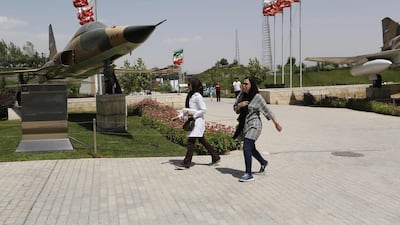“It’s complicated.” Perhaps this term is best to describe Iraqi-Iranian relations. Sharing a 1,458 kilometre-long border, the influence of the two countries on one another spans centuries.
While some Iraqis look to Iran as a natural ally, most are concerned about Tehran’s ambitions to flex its muscle in the country and call its political shots.
The relationship between Baghdad’s political elite and Tehran is in marked contrast with the most recent past. This month the two countries mark a sombre anniversary: 30 years since the end of the costly war that the two countries fought against one another.
While the end of the war itself was a good moment in time, the loss for both countries was huge.
Hundreds of thousands of Iraqis and Iranians died in combat; estimates range from 400,000 to 600,000 of war dead. Both countries conscripted all their able-bodied men as the war dragged on and the number of those returning with injuries was even higher.
According to the International Committee of the Red Cross (ICRC), the fate of tens of thousands of Iraqis and Iranians remains unknown after they went missing during the conflict.
An eight-year war that led to the bombing of the major cities of both countries continues to haunt generations who either lived through the war or lost relatives to it.
________________
Read more from Mina Al-Oraibi:
Sixty years on, Iraq needs a strong head of state for unity and sovereignty
Can multilateralism survive in the age of Twitter diplomacy?
Confusion threatens post-election hopes for Iraq
________________
For some, the war has not ended. In the aftermath of the 2003 war, pilots who had served in the Iraqi air force were targeted, with an estimated 182 Iraqi pilots who had flown warplanes over Iran killed between 2003 and 2004.
American cables posted on Wikileaks confirm the systematic targeting of Iraqi air force pilots in revenge killings that led to close to 1,000 Iraqi pilots fleeing the country.
Once touted as the best in the Arab world, Iraq’s air force was destroyed by these assassinations and forced displacement. Military leaders have since worked to regain the air force’s position but the loss of Iraq’s finest continues to haunt its armed forces.
Iran has been able to settle scores in Iraq over the last 15 years with the collapse of Iraq’s security apparatus and the failure of the US-led coalition to provide any real protection to those who ended up on hit lists drafted in Tehran.
Score-settling has also led to the targeting of specific industries in Iraq, including agriculture and local manufacturing, with Iran undercutting local markets.
With a lack of government oversight, Iraqi industries are suffering on multiple levels, including supermarkets packed with Iranian produce and Iraqi towns held hostage by Iranian electricity supplies.
Protests are a frequent occurrence in Iraq's south, week after week, as electricity supplies have all but broken down, in large part due to Iran's decision to cut back its electricity supply to Iraq.
Most significant is Iran’s influence on Iraqi militias like Kataib Hezbollah and Asaib Ahl Al Haq, set up by Iran and taking their orders from its Revolutionary Guard Corps.
As the famed commander of the Quds Force, Qassem Soleimani, crosses Iraq's border freely and holds meetings with its political leadership, Iraq's sovereignty is compromised.
Those who don’t see a problem with Iranian interference in Iraq argue that it is “natural” for Tehran to play a role in Iraq.
However, there is nothing natural for one nation-state to hold sway over thousands of armed men in a neighbouring country.
Nor is there anything natural in its ability to determine government formation, as has been the case over the past decade. And yet one must be cautious in overestimating Iran’s role in Iraq, as nationalist politicians and citizens alike try to find ways to limit Tehran’s role.
Iraq has long been referred to in Arabic as the “eastern frontier”, protecting the Arab world from historic Persian ambitions.
It was a term that former Iraqi dictator Saddam Hussein touted for years. And while Iraqis do not want their country to be a buffer zone in the region, leading to more bloodshed, there is an element of truth to Iran’s regional ambitions going through Iraq.
The country is integral to Tehran’s strategic plan to have a land corridor running to Lebanon and, more specifically, to Hezbollah.
What could have only been a far-fetched ambition 30 years ago has been realised in the aftermath of the Iraq war of 2003, the security vacuum that resulted and the complete reliance of Syrian President Bashar Al Assad’s regime on Iran for its survival.
Through Iraq and Syria’s internal conflicts, Iran has been able to translate its ambitions through militias and armed groups that report directly to the Iranian Revolutionary Guard.
Thirty years after the terrible war between the two countries, it is vital to ensure good relations between them. That requires Iran to respect Iraq’s sovereignty and to stop settling old scores.


